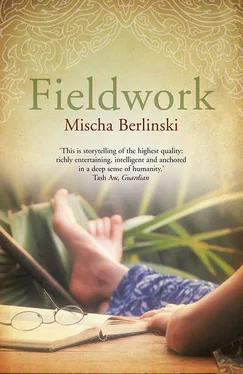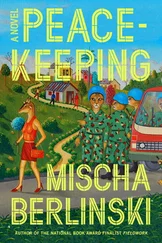I had never met a missionary before, and so contradictory was the impression produced by all these stories that I had little idea what to expect. I had grown up in Manhattan. The only serious Christian I had ever met was my co-op's handyman, a black man named Leon who was born again when I was about eleven after he went to a revival meeting in New Jersey. The phrase "born again" had confused me considerably at the time, and played on my imagination in horrific ways. All through my childhood and adolescence, Leon and I were friends, and I recall that once, after Kristin Skamanga dumped me, he told me in a serious voice, "It don't matter about that little girl, 'cause Jesus loves you — you know? He loves you with all His heart."
Beyond Leon, I knew no Christians who took their faith seriously. The missionary himself was a figure only from the short stories of Somerset Maugham, and I had imagined that the missionaries were faded relics of an earlier time, like Maugham's colonial administrators who drank gin slings on the veranda overlooking the jungle at the Club. An appointment to meet real missionaries like the Walkers thus struck me as intensely exotic, as if I had been invited to visit Bhutan. The stories about the Walkers, like the stories about Martiya, thrilled me: I hoped that they were all true.
Later, when I came to know the Walkers well, I decided that they were stranger, far stranger, than those who had traded rumors and spun idle gossip imagined.
Asking a mother about her murdered son is a delicate operation, like removing a stray lash from a child's eye. I had Mrs. Walker on the phone and was just starting to probe gently when she cut me off. "Oh, honey, you're here in Chiang Mai?" she asked. "Then you just come by the Mission one of these days and we'll talk. There'll be someone around. There always is."
Norma Walker said to drive north along the palm-fringed winding river road, past the Baptist church, then to take a right at the bar called Brasserie. "Do you know the place?" I certainly did: Rachel and I drank tequila there sometimes on Thursday nights when a long-haired guitarist named Tuk played note-perfect Jimi Hendrix and Santana covers with his backup band, the Tukables. I didn't mention the tequila on the phone. Norma Walker said that not long past the bar there would be a noodle stand on the left and another on the right. The compound was down the red dirt road just past the second noodle stand. I said that I'd be there the next day at one.
I arrived early. The cement wall surrounding the Walker compound was topped with broken glass; a discreet brass placard beside the closed gate read: south china christian mission. At the end of the alley, a tuk-tuk driver had parked his rickshaw under the shade of a banyan tree and was asleep, sprawled in the back of his carriage. I could hear his snores.
From the outside, the compound had looked huge. But when I rolled back the front gate of the compound along its rusted track and stepped inside, the place was disappointingly gray and dusty, almost dingy. A pair of trailers sat on cement blocks along one wall; and along the other wall there was a large concrete house painted a pale chewing-gum pink. An exterior staircase led to the house's second story, and then to its third— but the third story did not yet exist. Sturdy metal poles sprouted from the flat roof like antennae. The staircase simply wandered heavenward. Only a flowering jacaranda relieved the melancholy hot-season severity of the place, and snow-white blossoms drifted limply over the dead grass and dried mud. On the front stoop of the house, a small black cat with yellow eyes was licking her paws. I knocked on the door and wiped my forehead with my sleeve. I waited a moment and knocked again.
A voice sang out from the other side of the door, "Oh, Tom, just let yourself in." It was Mrs. Walker's voice.
Tom, Mischa — close enough. I slipped off my sandals and arranged them neatly beside the other shoes: the rubber sandals, the tennis shoes, the mud-caked leather work boots, the worn-down flip-flops, and the knee-high galoshes. I opened the unlocked door and stepped into the house.
An old woman looked up at me from a couch set at an angle to the front door. She was fleshy, and just slightly more of her pink-gray skin slipped out from under her faded blue housedress than I was meant to see: hints of puffy knees expanded to puffy calves lined with varicose trails leading down to puffy ankles. A puffy face rested on a puffy neck. Only her pale-green eyes were sharp, but they were very sharp, and they looked me up and down critically. "Oh, you are not Tom Riley at all ," she concluded, after a considerable period of judgment.
"No," I admitted, and to cover the silence which fell over the room, I added, idiotically, "I'm sorry."
"Don't be sorry," the woman replied evenly. "I'm not Tom Riley either, after all."
Having established to our mutual satisfaction that my failure to be Tom Riley implied no moral fault, she paid me no further mind, as if expecting that I knew the routine around here.
"I'm so sorry to bother you," I finally said. "But I called yesterday. I'm Mischa Berlinski. And you must be Mrs. Walker."
"I am," the woman said. "Only, you can call me Nomie. Everyone does."
"Okay, Nomie," I obliged. I was still standing in the doorway, so I added, "I was going to come at one."
"Then you're right on time," Nomie said. "Don't mind me if I don't get up. Mr. Walker will be with you in a moment. You just make yourself comfortable right there."
She gestured to a couch opposite her own, and closing the door behind me, I took my place. On the phone the day before, I had indicated no preference as to which of the Walkers received me.
On the couch beside Nomie there was a ball of bright-blue yarn, which the old woman began to play with, spooling out several inches of thread, wrapping it around her thick fingers, and then rolling the yarn back onto the skein. She was not a woman to whom I would have otherwise applied the adjective "kittenish." She seemed absorbed in the operation, but she must have noticed me staring at the ball, because she said, "The doctor told me this would be good for the arthritis."
"Does it help?"
"I'm not sure just yet, but I do pray for some relief."
There were no portraits of family, no bookshelves on the whitewashed walls. The only furniture was the fake-leather couch where Nomie sat, the fake-leather couch on which I had installed myself, and a wooden rocking chair. In the far corner there was an upright piano, its closed lid supporting a small tank in which three large goldfish swam frantic laps, like athletes in training for a goldfish Olympiad.
"Can I offer you a cool glass of orange Tang?" Nomie asked.
For the first and only time in my adult life, I was seized by the desire for a cool glass of orange Tang. I was aware suddenly that my throat was desperately parched, and I didn't just want but needed a cool glass of orange Tang. "That would absolutely hit the spot," I said.
Nomie looked down at the ball of yarn in her hand, which she continued to knead. Then she spoke very loudly in an utterly foreign language. It was a language with sounds I had never heard before, like whale song, or Martian. Her voice swooped and glided, and she inserted vowels and diphthongs which seemed to come from the deepest recesses of her gullet. The only word I understood was "Tang," pronounced like the Chinese dynasty.
There was a pause and then a sympathetic feminine voice shouted out, "Okey-dokey, Grandma." A few seconds later, a young woman entered the room, carrying a tray of glasses and a tall glass pitcher beaded with perspiration. She set the tray down on the coffee table. "Cool Tang!" she said.
The young woman poured me a glass of orange Tang from the pitcher. "Thank you," I said. I took a sip, and for a second my mouth was flooded with long-forgotten memories of kindergarten. "You know, I had forgotten how much I like Tang."
Читать дальше












